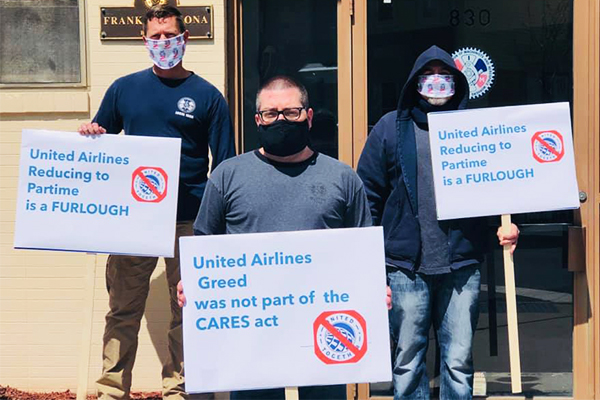
The IAM’s campaign and the resulting public outrage against United Airlines has caused the carrier to back away from its illegal scheme to force 15,000 full-time IAM members into part-time positions.
Continue reading

The IAM’s campaign and the resulting public outrage against United Airlines has caused the carrier to back away from its illegal scheme to force 15,000 full-time IAM members into part-time positions.
Continue readingSee the chart at the link below.
https://m.facebook.com/spindrmike/posts/10157390579367887?d=m
18.10.2018
IndustriALL Global Union and affiliates representing BHP workers in Australia, Brazil, Canada and Colombia challenged the mining giant’s unsustainable and dangerous business model, at its annual general meeting in London on 17 October.
IndustriALL’s assistant general secretary, Kemal Özkan, questioned the world’s biggest mining company’s over its claims of sustainability, which he argued is not just about economic performance but also the environment, society and labour.
As a multinational company, BHP should adhere to international standards and create safe, decent work, while respecting social dialogue, social protection and workers’ fundamental rights, said Özkan.
BHP has laid off 20,000 workers in two years, while distributing a record US$6.3billion to shareholders in 2018. BHP now employs around 26,000 permanent staff compared to 34,500 contract workers.
Jeff Drayton, from Australian union, CFMEU, questioned BHP over the correlation between the rise in contract labour at BHP’s Mt Arthur coalmine in New South Wales and an increase in safety incidents. In a few short years, contract labour has grown from around 10 to 50 per cent of a total workforce of 1,600. Contract labour is paid around 40 per cent less at the thermal coal mine.
Steve Smyth, from CFMEU in Queensland, demanded to know why BHP workers suffering from coal dust diseases are not being reported as ‘lost time injuries’, despite being months off work. Earlier this year, miner Tyrone Buckton, passed away from coal dust diseases, silicosis and black lung, after decades of working at BHP.
While BHP owned up to two deaths at its mines over the past year, Aldo Amaya from IndustriALL affiliate, Sintracarbón, asked why the death of Carlos Roberto Urbina at the Cerrejón mine in Colombia was not in the annual report. BHP has a 30 per cent stake in the mine. He also accused BHP of using technology in cabs to penalize drivers if they are tired.
Also in Latin America, IndustriALL mining section co-chair Lucineide Varjão from Brazilian union CNQ/CUT, asked BHP what it planned to do about 2,000 workers who lost their jobs following the disastrous collapse of Fundão Dam in 2015, which killed 19 people, among them 14 workers.
IndustriALL’s mining co-chair Steve Hunt from the United Steelworkers in Canada, called on the company to cooperate with unions and carry out joint audits of their mines.
Meanwhile, BHP’s chairman Ken MacKenzie refused to discuss legacy issues from mines it spun off in a separate company, South32. IndustriALL affiliate, the National Union of Mineworkers in South Africa have been severely affected by job cuts at the company.
“BHP says safety is its first priority but from our experience this is just not the case. The responses we got from at the annual general meeting today were wholly inadequate. If BHP wants to be safe and sustainable, it must start by including workers and trade unions at every step,” said Kemal Özkan.
While in London for the AGM, IndustriALL’s BHP global network meeting met from 16 to 18 October and agreed to focus on issues of contracting, health and safety and organizing women workers at the company. BHP plans to employ 50 per cent women by 2025.
There could be some very tough days ahead for labour in the United States. It’s hard to believe that things may be heading back 70 years when it comes to the rights of workers. The attached video explains just what could happen if the Supreme Court started to reverse current labour laws and the effects it could have on workers.

Thursday, May 24, 2018